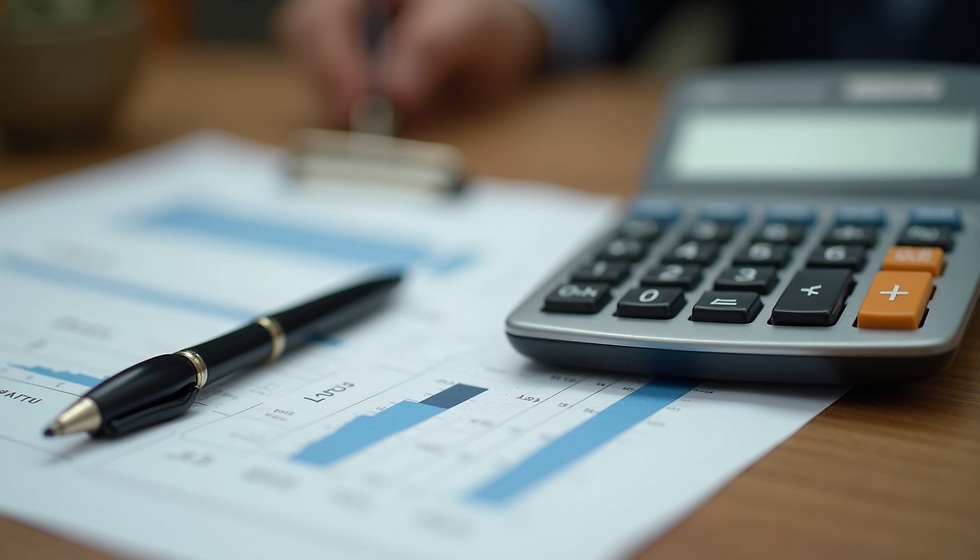The Importance of Keeping Personal and Business Receipts Distinct for Financial Clarity
- Susan of Well Balanced Books
- Jul 28, 2025
- 3 min read
In today’s fast-paced world, maintaining financial clarity is crucial for everyone, especially business owners and freelancers. One often overlooked aspect of achieving this clarity is separating personal and business receipts. Keeping these two types of receipts distinct offers multiple benefits that extend beyond simple organization.
Understanding why this practice is vital can help you manage your finances better. This article will highlight its significance, practical separation approaches, and how it can positively impact your overall financial health and decision-making.
Understanding the Importance of Separation
Mixing personal and business receipts leads to confusion, complicating budgeting, accounting, and tax preparation. For instance, when a freelancer files taxes with mixed expenses, they risk losing eligible deductions. In fiscal year 2022, nearly 30% of small businesses faced penalties during audits for this reason.
Maintaining separate receipts ensures transparency in financial reporting, simplifying budgeting by providing a clearer picture of expenses and profitability. Isolating business expenses empowers you to understand where your money goes, allowing for smarter financial choices.
Tax Benefits
A key reason for keeping personal and business receipts distinct is to unlock potential tax benefits. Many government jurisdictions allow business expenses to be tax-deductible. For example, claims for office supplies and client dinners can lower taxable income, leading to substantial savings—upwards of 20%.
Mixing personal and business expenses, however, raises red flags during audits. The risk of penalties or disallowed deductions adds unnecessary stress to tax filing. Staying organized by maintaining separate receipts helps you maximize eligible deductions and protects you from the repercussions of a potential audit.
Simplifying Accounting and Bookkeeping
Effective accounting is the backbone of successful business operations. When personal and business expenses intermingle, tracking financial health becomes substantially more complicated.
Organizing your receipts efficiently can save time and effort in the long run. By creating distinct categories for personal and business expenses, you can simplify accounting processes, present clearer financial reports to stakeholders, and improve your relationship with accountants or bookkeepers. This clarity makes tracking your financial health easier and empowers you to strategize for future growth.
How to Keep Receipts Separate
Here are practical strategies to keep your personal and business receipts organized:
Use Separate Accounts: Maintain separate bank accounts and credit cards for personal and business transactions. This prevents mix-ups right from the start, making expense tracking more straightforward.
Digital Tools and Apps: Utilize receipt scanning apps that categorize receipts automatically. For example, apps like Expensify and Receipt Bank allow you to store receipts securely in the cloud, making retrieval simple when needed.
Physical Storage: If you prefer traditional methods, use different folders or filing systems. Designate specific areas for business receipts, ensuring that only work-related transactions go there.
Regular Reviews: Schedule regular reviews of your expenses. This practice not only helps keep you organized but also sharpens your awareness of your spending habits, improving future budgeting decisions.
Enhancing Financial Awareness
Keeping personal and business receipts distinct offers a chance to improve financial awareness. Tracking business expenses separately helps you recognize spending habits. For instance, a small business might find it is regularly overspending on unproductive advertising. This realization can prompt necessary changes, ultimately leading to more effective budgeting and spending habits.
Streamlining Business Operations
Financial clarity gained from keeping personal and business receipts separate helps streamline business operations significantly. Accurate records enable timely decision-making regarding investments and cash flow.
When you understand exactly where your money is going, you can proactively adjust strategies. Small improvements in operations can yield substantial long-term growth. In fact, companies that closely track expenses are 15% more likely to grow their revenue compared to those that do not.
Final Insights
Keeping personal and business receipts separate is more than a matter of organization; it’s an essential practice for achieving financial clarity and sound decision-making. The potential tax savings, simplified accounting, and increased spending awareness greatly benefit both personal and business finances.
By implementing effective strategies for keeping these receipts distinct, individuals and business owners can work toward greater financial success. The time and effort invested in organizing your receipts can lead to substantial returns in clarity, efficiency, and peace of mind.

.png)





